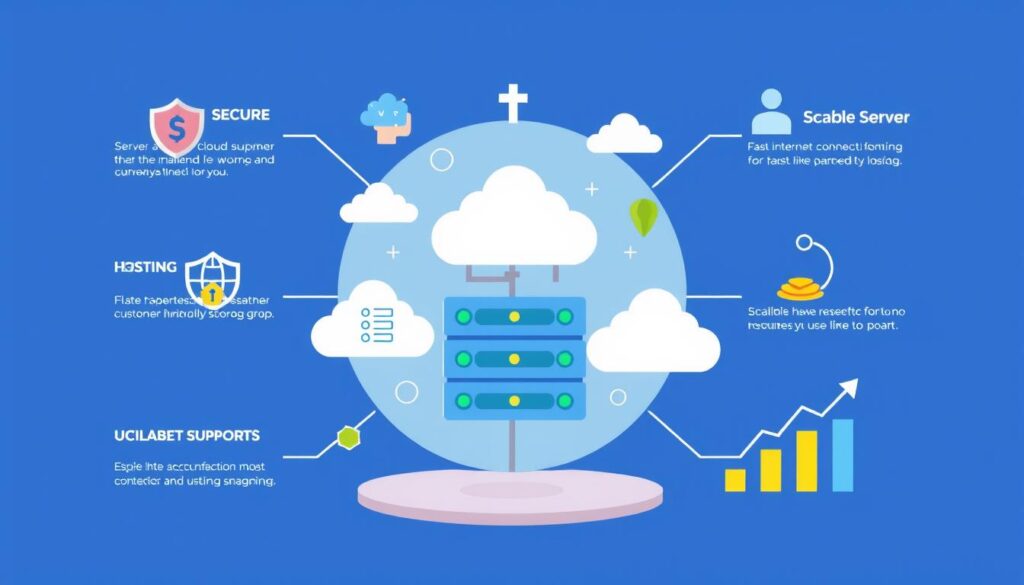**This blog contains my affiliate links**
In the dynamic world of online presence, having the right web hosting plan is crucial for the success of your blog or business. Whether you’re just starting out or looking to upgrade your existing setup, navigating the vast array of hosting options can be a daunting task. This comprehensive guide will empower you to make an informed decision and find the perfect hosting solution to meet your specific needs.
From understanding the fundamentals of web hosting to exploring the various hosting types, we’ll delve deep into the factors that will help you identify your website’s requirements and choose the best hosting plan. From shared hosting to virtual private servers (VPS), dedicated servers, and cloud hosting, we’ll examine the pros and cons of each option, ensuring you have the knowledge to make a well-informed choice.
By the end of this article, you’ll be equipped with the tools and insights necessary to select the hosting plan that aligns seamlessly with your blog or business goals, delivering a stable, secure, and high-performing online presence that drives your success.
Key Takeaways
- Understand the fundamentals of web hosting and the different types of hosting services available.
- Identify your website’s specific needs, including traffic, resource requirements, and future growth potential.
- Explore the advantages and disadvantages of shared hosting, VPS, dedicated servers, and cloud hosting.
- Evaluate essential hosting features, such as security, scalability, and customer support.
- Consider your budget and pricing factors when selecting the best hosting plan for your blog or business.
Understanding Web Hosting Essentials
As you embark on building your blog or business online, understanding the fundamentals of web hosting is crucial. Web hosting is the foundation upon which your website rests, ensuring it is accessible to your audience on the internet. It involves storing your website’s files on a server and making them available to users whenever they visit your site.
What is Web Hosting?
Web hosting is the service that provides the necessary infrastructure and resources to make your website visible online. Namecheap, a leading hosting provider, offers a wide range of hosting solutions to cater to the diverse needs of businesses and individuals alike.
Types of Web Hosting Services
When it comes to web hosting, there are several options to consider, each with its own advantages and disadvantages. Some of the most common types of hosting services include:
- Shared Hosting: An affordable and beginner-friendly option where your website shares server resources with other sites.
- Virtual Private Server (VPS) Hosting: Provides more dedicated resources and flexibility than shared hosting.
- Dedicated Server Hosting: Offers the highest level of control and performance, with a server dedicated solely to your website.
- Cloud Hosting: A scalable solution that utilizes a network of servers to ensure reliability and flexibility.
Choosing the right web hosting plan for your needs is essential for the success and growth of your online presence. As you explore these options, consider factors such as your website’s traffic, resource requirements, and future growth potential to make an informed decision.
“The right web hosting plan can make all the difference in the success and growth of your online presence.”
Identifying Your Website’s Needs
Before selecting a hosting plan, it’s crucial to assess your website’s specific needs. This includes understanding your expected traffic, resource requirements, and plans for future growth and scalability. By carefully analyzing these factors, you can choose the most suitable hosting solution that meets your current and future needs.
Website Traffic and Resource Requirements
Evaluating your website’s anticipated traffic patterns is a key step in identifying the appropriate hosting plan. Consider factors such as the number of visitors, the type of content you’ll be hosting, and the expected peak traffic periods. This information will help you determine the necessary storage, bandwidth, CPU, and RAM resources to ensure your website’s smooth performance.
Future Growth and Scalability
As your website grows, your hosting needs may change. When selecting a hosting plan, it’s essential to consider your plans for future expansion, such as adding more content, integrating e-commerce features, or increasing user engagement. Choosing a hosting provider that offers scalable options, such as Namecheap hosting or shared hosting, can help you seamlessly accommodate your website’s evolving requirements.
“The right hosting plan can make all the difference in the success of your website or blog.”
By carefully evaluating your website’s traffic patterns, resource requirements, and plans for future growth, you can confidently choose the hosting plan that best supports your online presence and business objectives.
Shared Hosting: The Affordable Option
When it comes to getting your website up and running, Namecheap shared hosting can be an excellent choice, especially for new bloggers and small businesses on a tight budget. Shared hosting is a cost-effective solution that allows you to share server resources with other websites, making it an ideal starting point for your online presence.
One of the primary advantages of shared hosting is its affordability. By sharing the server’s resources, such as storage space and bandwidth, the hosting costs are divided among multiple users, resulting in a more budget-friendly option. This makes shared hosting an attractive choice for entrepreneurs, freelancers, and individuals who are just starting out and looking to establish their online footprint.
However, it’s important to understand the limitations of shared hosting. Since multiple websites are hosted on the same server, there is a shared pool of resources, which means your website may experience performance fluctuations during periods of high traffic or resource-intensive tasks. Additionally, the level of control and customization available in shared hosting environments is typically more limited compared to other hosting solutions, such as VPS or dedicated servers.
Despite these drawbacks, shared hosting from Namecheap can still be a viable option for many users. It provides a solid foundation for your website, allowing you to test the waters and build your online presence without a significant financial investment. As your website grows and your needs evolve, you can always explore upgrading to a more robust hosting solution that better suits your requirements.
Virtual Private Server (VPS) Hosting: A Step Up
For websites that require more resources and control than shared hosting can provide, VPS hosting may be the solution. VPS hosting offers a middle ground between the simplicity of shared hosting and the power of a dedicated server. In this section, we’ll explore the benefits and drawbacks of VPS hosting, helping you determine if it’s the right choice for your Namecheap hosting needs.
Benefits of VPS Hosting
VPS hosting provides a range of advantages that make it an attractive option for many website owners and bloggers. Some of the key benefits include:
- Increased server resources: VPS hosting allocates dedicated resources, such as CPU, RAM, and storage, to your website, ensuring it has the power to handle more traffic and resource-intensive applications.
- Enhanced performance: With your own virtual server environment, you can expect faster page loading times and a more responsive user experience, even during peak traffic periods.
- Scalability: As your website grows, you can easily upgrade your VPS hosting plan to accommodate the increased demands, ensuring your site remains efficient and reliable.
- Greater control: VPS hosting offers a higher degree of control over your server environment, allowing you to customize software, install applications, and manage your hosting settings to suit your specific needs.
Drawbacks of VPS Hosting
While VPS hosting provides numerous benefits, it’s important to consider the potential drawbacks as well:
- Higher cost: Compared to shared hosting, VPS hosting is typically more expensive, as you’re paying for dedicated resources and a higher level of control.
- Technical complexity: Managing a VPS requires a higher level of technical expertise, as you’ll be responsible for tasks such as server configuration, software updates, and security maintenance.
- Limited customization: While VPS hosting offers more customization options than shared hosting, the level of customization may still be limited compared to a dedicated server.
When evaluating your hosting options, it’s essential to weigh the benefits and drawbacks of VPS hosting to determine if it’s the right fit for your Namecheap hosting needs and your website’s specific requirements.

“VPS hosting is the perfect solution for websites that have outgrown shared hosting but don’t require the full resources of a dedicated server.”
Dedicated Server Hosting: Maximum Control
For businesses with high-traffic websites or specialized hosting requirements, dedicated server hosting may offer the ultimate solution. This hosting option provides you with complete control over the server environment, ensuring unparalleled performance and security for your online presence.
One of the primary benefits of dedicated server hosting is the ability to customize the server to your exact needs. You’ll have the freedom to choose the operating system, software, and hardware configurations that best suit your business requirements. This level of control allows you to optimize your website’s performance, tailor the server’s resources, and implement robust security measures to protect your sensitive data.
Furthermore, dedicated servers offer superior processing power and storage capabilities, making them an excellent choice for resource-intensive applications, e-commerce platforms, or websites that experience significant traffic spikes. With a dedicated server, you won’t have to worry about sharing resources with other users, ensuring your website’s responsiveness and reliability.
However, it’s important to note that dedicated server hosting typically comes with a higher price tag and requires a higher level of technical expertise to manage. Businesses that opt for this solution will need to either have an in-house IT team or be willing to invest in ongoing maintenance and support from their hosting provider.
“Dedicated server hosting provides the ultimate control and performance for high-traffic websites and mission-critical applications.”
Overall, dedicated server hosting is an excellent choice for businesses that require maximum control, unparalleled performance, and a high level of security for their online presence. By partnering with a reputable hosting provider like Namecheap, you can ensure that your website or application has the resources and support it needs to thrive in the digital landscape.
Cloud Hosting: Flexibility and Reliability
In the ever-evolving world of web hosting, cloud hosting has emerged as a modern and versatile solution that offers both flexibility and reliability. This innovative approach to web hosting has gained widespread popularity, particularly among bloggers and small-to-medium-sized businesses seeking a reliable and scalable hosting platform.
Advantages of Cloud Hosting
One of the primary advantages of cloud hosting is its ability to provide on-demand resource allocation. Unlike traditional Namecheap or shared hosting plans, cloud hosting allows users to easily scale their resources up or down based on their changing needs. This means that your website can seamlessly handle spikes in traffic or resource-intensive tasks, ensuring a smooth and uninterrupted user experience.
Another key benefit of cloud hosting is its enhanced reliability and uptime. Cloud hosting platforms are designed with redundancy and failover mechanisms, ensuring that your website remains accessible even in the event of hardware failures or unexpected outages. This translates to increased uptime and a more reliable online presence for your blog or business.
Disadvantages of Cloud Hosting
While cloud hosting offers numerous advantages, it is important to be aware of potential drawbacks as well. The complexity of cloud infrastructure can sometimes present a steeper learning curve for users, especially those who are more accustomed to traditional hosting solutions. Additionally, security concerns in the cloud environment may need to be carefully addressed to ensure the protection of your sensitive data and website assets.
Overall, cloud hosting has emerged as a powerful and flexible hosting solution that caters to the needs of modern websites and businesses. By understanding the advantages and potential drawbacks, you can make an informed decision about whether cloud hosting is the right fit for your blog or business.
namecheap, hosting, shared hosting
As a leading provider of web hosting services, Namecheap offers a range of hosting solutions to cater to the diverse needs of businesses and individuals. One of their popular offerings is shared hosting, which provides an affordable and user-friendly hosting experience.
Namecheap‘s shared hosting plans are designed to meet the requirements of small to medium-sized websites, blogs, and online projects. These plans boast a robust set of features, including ample storage, bandwidth, and email accounts, making them an attractive choice for those just starting out or running a low-to-moderate traffic website.
The shared hosting packages from Namecheap are competitively priced, allowing users to find a plan that fits their budget. With plans starting as low as $1.58 per month, Namecheap’s shared hosting offers excellent value for money, making it an accessible option for those on a tight budget.
In addition to the affordable pricing, Namecheap‘s shared hosting plans also deliver reliable performance and uptime, ensuring your website remains accessible and responsive to your visitors. The company’s commitment to maintaining a robust infrastructure and providing top-notch customer support further enhances the overall user experience.
“Namecheap’s shared hosting plans are a great choice for those looking for a budget-friendly, yet reliable hosting solution to power their online presence.”
Whether you’re launching a new website or looking to migrate your existing one, Namecheap‘s shared hosting plans offer a well-rounded and affordable solution that can meet the needs of a wide range of users. With its extensive feature set, reliable performance, and responsive customer support, Namecheap’s shared hosting is a strong contender in the web hosting market.
Evaluating Host Features and Support
When selecting a Namecheap hosting provider for your blog or business, it’s crucial to carefully evaluate the features and support they offer. The right hosting plan can make all the difference in ensuring your website runs smoothly and efficiently.
Essential Features to Look For
Start by considering the essential features that will meet the needs of your website. Look for providers that offer reliable uptime guarantees, ample storage and bandwidth to accommodate your content and traffic, and robust security measures to protect your online presence. Additionally, convenient website management tools can streamline the day-to-day tasks of maintaining your site.
Importance of Reliable Customer Support
In the world of shared hosting, the quality of customer support can make or break your hosting experience. Look for providers that offer responsive and knowledgeable support teams, available through multiple channels such as phone, email, or live chat. Reliable customer support can be invaluable when you encounter any technical issues or need assistance with your hosting-related tasks.
“The right hosting provider can make all the difference in the success of your online presence. Carefully evaluate the features and support to find the best fit for your needs.”
By prioritizing essential features and reliable customer support, you can ensure that your Namecheap hosting plan provides the foundation for a thriving online presence, whether you’re running a personal blog or a growing business.

Budgeting and Pricing Considerations
When it comes to choosing the right hosting plan for your blog or business, budgeting and pricing considerations play a crucial role. The cost of web hosting can vary significantly depending on the features, resources, and level of support you require. As you evaluate your options, it’s essential to find the optimal balance between your website’s needs and your available budget.
One of the most affordable options on the market is shared hosting from providers like Namecheap. Shared hosting plans typically offer a cost-effective way to get your website online, with monthly or annual fees ranging from a few dollars to a few dozen dollars, depending on the plan’s features. While shared hosting may have limitations in terms of resources and customization, it can be an excellent choice for small to medium-sized websites with modest traffic and resource requirements.
As your website grows and your needs become more complex, you may need to consider upgrading to a virtual private server (VPS) or a dedicated server. These hosting solutions offer more resources, flexibility, and control, but they also come with a higher price tag. It’s essential to carefully evaluate your website’s current and future needs to determine the most cost-effective hosting plan that meets your requirements.
In addition to the monthly or annual hosting fees, you should also factor in any setup charges, domain registration costs, and the potential expenses of additional services or add-ons. By carefully budgeting and weighing the costs against the features you need, you can make an informed decision that aligns with your website’s needs and your financial constraints.
“Ultimately, the right hosting plan is the one that provides the best value for your money, allowing you to effectively power your blog or business online.”
Remember, the world of web hosting is vast and dynamic, with a range of options to choose from. By understanding your website’s requirements and aligning them with your budget, you can find the hosting solution that best fits your needs and helps your online presence thrive.
Conclusion
In our comprehensive exploration of web hosting, we’ve covered the essential elements to consider when selecting the best hosting plan for your blog or business. From understanding the fundamentals of web hosting to evaluating the unique needs of your website, we’ve provided a roadmap to guide you through the decision-making process.
Whether you’re seeking an affordable shared hosting solution from Namecheap or exploring the benefits of more advanced options like virtual private servers (VPS) or dedicated servers, the key is to align your hosting plan with your current and future requirements. By carefully assessing factors like website traffic, resource demands, and scalability, you can ensure your online presence is supported by a reliable and cost-effective hosting provider.
As you embark on your web hosting journey, remember the importance of evaluating host features, customer support, and overall value. With the right hosting plan in place, you’ll be well on your way to building a successful and thriving online presence for your blog or business. Namecheap‘s range of hosting solutions, coupled with its commitment to customer satisfaction, make it an excellent choice for your web hosting needs.
FAQ
What is web hosting, and how does it work?
Web hosting is the service that allows individuals and organizations to publish their websites on the internet. It involves storing your website’s files on a server and making them accessible to users who visit your website through a domain name.
What are the different types of web hosting services?
The main types of web hosting services include shared hosting, virtual private server (VPS) hosting, dedicated server hosting, and cloud hosting. Each type offers varying levels of resources, control, and pricing to meet the needs of different website owners.
How do I determine my website’s hosting requirements?
To determine your website’s hosting requirements, you should consider factors such as expected traffic, resource needs (storage, bandwidth, CPU, and RAM), and plans for future growth and scalability. Understanding these key factors will help you choose the most suitable hosting plan for your blog or business.
What are the benefits of shared hosting?
Shared hosting is often the most budget-friendly option, particularly for new websites and small businesses. It offers cost-effectiveness and easy management, but it also has limitations in terms of resources and control over the server environment.
What are the advantages of VPS hosting?
VPS hosting provides more server resources and enhanced performance compared to shared hosting. It offers increased control over the server environment, better scalability, and improved security. However, VPS hosting also requires more technical expertise to manage.
When is dedicated server hosting the best choice?
Dedicated server hosting is ideal for businesses with high-traffic websites or specialized hosting requirements. It offers complete control over the server environment, increased performance, and greater security. However, dedicated servers come with higher costs and the need for technical expertise to manage the server.
What are the benefits of cloud hosting?
Cloud hosting offers scalability, flexibility, and reliability. It allows for on-demand resource allocation, automatic scaling, and enhanced uptime. However, cloud hosting can be more complex to set up and may have potential security concerns.
What features should I look for when choosing a hosting provider?
When evaluating hosting providers, it’s important to consider essential features such as uptime guarantees, storage and bandwidth limitations, security measures, and website management tools. Additionally, reliable customer support is crucial for ensuring a smooth hosting experience.
How do I budget for web hosting?
Budgeting for web hosting involves considering monthly/annual fees, setup charges, and any additional services or add-ons. It’s important to find the optimal balance between cost and the features your website requires to ensure long-term success.

